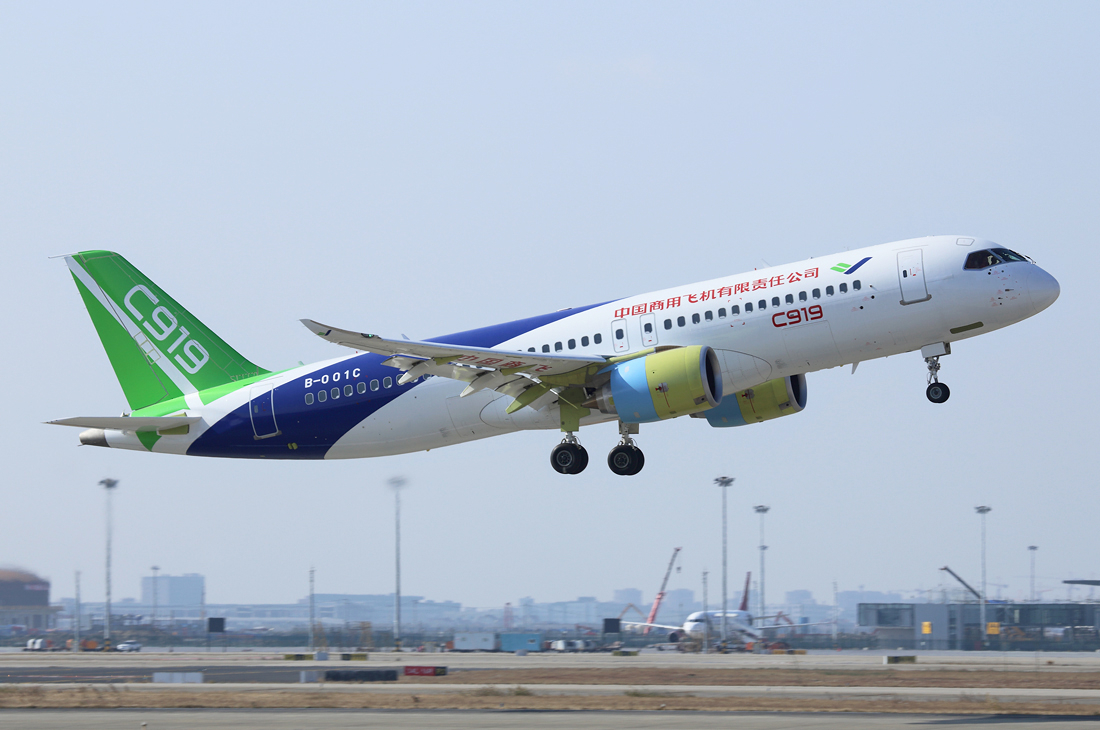CHINA – Suparna Airlines, a Chinese airline owned by Hainan Airlines, has signed a contract with aircraft lessor SPDB Financial Leasing for the lease of 30 domestically built COMAC C919 jets.
The deal entails the acquisition of 30 domestically built C919 jets from the Commercial Aircraft Corporation of China (COMAC). The agreement, estimated at an impressive $3.6 billion, marks a significant waypoint for both Suparna Airlines and China’s aviation sector.
The C919: A Homegrown Game-Changer
The C919, hailed as China’s first large homegrown passenger jet, is poised to rival renowned aircraft like the Boeing 737 and Airbus A320. Boasting leading-edge technology and innovative features, the C919 has already entered service with China Eastern Airlines in May 2023, signifying its readiness for commercial operations.

Suparna Airlines’ Ambitious Expansion Plans
Expected to receive its initial C919 aircraft in 2024, Suparna Airlines has strategic plans to employ these state-of-the-art jets to bolster its domestic passenger network. The decision to integrate the C919 into their fleet reflects the airline’s vision for growth and innovation.
The acquisition of the C919 by Suparna Airlines not only enhances the airline’s standing but also signifies China’s soaring ambition in the aviation market. With the C919 emerging as a formidable competitor to the Boeing 737 and Airbus A320, China demonstrates its ability to produce world-class aircraft that can rival established players in the industry.
Designed for Success
The C919 program was launched in 2008. Production began in December 2011, with the first prototype rolled out on 2 November 2015 and having its maiden flight on 5 May 2017. On 29 September 2022, the C919 received its CAAC type certificate.
The first production airframe was delivered to China Eastern Airlines on 9 December 2022 and was put into commercial passenger service on 28 May 2023.
The C919 is engineered with modern features that elevate its competitiveness among foreign counterparts. The inclusion of a fly-by-wire system enhances automation and ensures superior safety standards.
Additionally, the C919 boasts lower fuel consumption compared to its Boeing and Airbus counterparts, making it an economically viable option for airlines. It is available in a variety of configurations, with a capacity of 158 to 192 passengers. The aircraft has a range of 4,075 to 5,555 kilometers.
Suparna Airlines and COMAC
For COMAC, the Chinese aircraft manufacturer, the deal with Suparna Airlines represents a culmination of years of dedication and hard work. Having developed the C919 over the span of a decade, the scale of the latest agreement with Suparna Airlines comes as a further clear indication of the aircraft’s viability and readiness for commercial service.
Enthusiasm from Industry Leaders
Suparna Airlines’ CEO, Zhang Xiaofei, expressed the airline’s excitement over the new addition to their fleet, emphasizing the significance of the Chinese market entry by COMAC.
The CEO sees the C919 as a symbol of progress and innovation in the sector, saying: “This aircraft is a significant milestone for China’s aviation industry, and we are proud to be one of the first airlines to operate it.”
“We are pleased to see that Suparna Airlines has placed its confidence in the C919,” said COMAC CEO Li Jun in his response. “This deal is a major milestone for the C919 program, and we are confident that the aircraft will be a success.”
Deal Details: The Fine Print
The lease agreement between Suparna Airlines and SPDB Financial Leasing spans 12 years. The C919 jets will be configured in a single-class layout with 168 seats. Notably, Suparna Airlines will become the first Chinese airline to operate the C919 under a dry lease arrangement.

